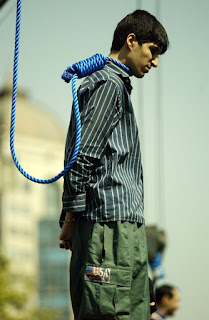GALILEO FACES THE INQUISITION
There is an essential tension between the risks of thought and the comforts of certainty. The comfortably certain sense that the glue that holds their world together is soluble when immersed in inquiry. So, whenever possible, they wipe out that threat by stifling the search and muzzling, even murdering, the thinker.
Galileo's 'crimes' were:
1. “Making the proposition that the sun is in the center of the world and immovable from its place is absurd, philosophically false, and formally heretical; because it is expressly contrary to Holy Scriptures.”
2. “Making the proposition that the earth is not the center of the world, nor immovable, but that it moves, and also with a diurnal action, is also absurd, philosophically false, and, theologically considered, at least erroneous of faith.”
Wielding the authority of their offices, the Pope and the Lords of the Inquisition determined that when Galileo abandoned the scriptures and heeded his own observations he strayed from truth into error, from virtue into vice, and from morality into immorality. Hence the Holy Inquisition determined that Galileo’s thought and resultant findings were “unlawful” as well as “disordered and immoderate.”
Galileo's findings were neither "disordered" nor "immoderate." He was 100% right when he "abandoned the scriptures and heeded his own observation." But it took the Roman Catholic Church 359 years to admit that. That's quite a while.
This is no isolated instance. History is crammed with example after example of established authority declaring that the results of thought and evidence were “disordered and immoderate. It happened whenever it discomforted them or threatened their interests.
Consider, for instance, a few of the many vital medical discoveries that were initially regarded as disordered and immoderate by the established authorities of the day:
• Dissecting and studying the structures and functions of the human body
• Inoculation
• Vaccination
• The germ theory of disease
• Anesthesia
In thousands of similar instances the prevailing authorities tried their very best to wipe out unwelcome thoughts and resultant conclusions. In short anything that disturbed contemporary ignorance and threatened established authority.
We still have that today. Only nowadays it includes not only right wingers but leftist so-called professors. Disagree with these academic thought police, disturb their self-righteousness, and you are immediately branded a racist, fascist, male chauvinist pig, ad nauseam. Your arguments and facts might be totally accurate. Nevertheless, an academic inquisition, composed of right-thinking 'scholars' and their administrative bedfellows (Uniformly desperate to keep the tuition flowing.) will likely find you guilty as charged.
What will become of American democracy should these contemporary thought police, composed both of dogmatists on the right and the left, actually succeed in stifling, even banning, thought? George Orwell describes it this way. "A nation of warriors and fanatics, marching forward in perfect unity, all thinking the same thoughts and shouting the same slogans, perpetually working, fighting, triumphing, persecuting — three hundred million people all with the same face."
Is that what we want?
For similar considerations see www.newfoundations.com

